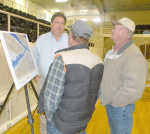Irrigators calling for fair treatment

Some irrigators who will be affected by the state's proposal to reduce irrigation in dry years are none too happy about the prospect.
"The solution is to treat everyone equally," said Roger Goltl at the presentation given by state water officials at the McCook Memorial Auditorium Tuesday. A private contractor who also has irrigated land in Culbertson, Goltl said under the state proposal, it would be as if a water shortage occurred in McCook and those on the east side of town would not get water, so the west side would have enough. "The only way this will work is if it's fair, to treat everyone equally, until augmentation can be used," he said.
Officials from the Nebraska Department of Natural Resources explained at Tuesday's meeting that Nebraska doesn't have the regulations in place to keep Nebraska in compliance with Kansas in water-short years. Adopting one of the options will be a way that Kansas gets enough water from the Republican River in water short years, years when the irrigation supply in Harlan County Reservoir falls below 119,000 acre feet.
The three natural resources districts in the Republican River Basin -- the Middle in Curtis, the Upper in Imperial and the Lower at Alma -- must choose one of three options the state has offered concerning irrigation in their districts. These options are:
* Option 1: decrease pumping allocations in all three districts to be used in average or dry years: 3.6 inches in the Lower, 4.8 in the Middle and 5.9 in the Upper. With this option, no other regulations would apply, except surface water would be curtailed if needed to ensure compliance in dry years.
* Option 2: allow groundwater users to keep pumping at the current allocation but in water short years, curtail surface water and ground water pumping in wells near the river.
* Option 3: the same as Option 2 but would affect a smaller number of wells.
Under option three, about 37,000 acres in the Middle NRD would be affected, said Middle NRD Manager Dan Smith, with about 420 wells shut down. The Lower would have 45,000 acres affected with 550 wells shut down, and the Upper, 22,700 acres affected and about 220 wells shut down.
The scenario under Option 1, when pumping allocations are severely reduced, doesn't sit well with some, like James Uerling, a board member of the MIddle NRD. "Allocations should be the same for everyone," he said.
Augmentation, or piping water from one basin to another, costs millions of dollars and the new taxes in the water law LB 701 was suppose to help Republican River NRDs fund such projects. That law allowed the NRDs to levy an additional property tax along with an occupation tax on irrigated acres, with the funds collected to pay for projects like augmentation. But the property tax was found to be unconstitutional by the Nebraska Supreme Court and the occupation tax is also being challenged as unconstitutional, with the case pending in Lancaster District Court in Lincoln.
The state would like the NRDs to adopt one of the options before the end of the year.
